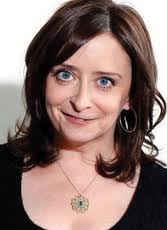The Bedwetter by Sarah Silverman
I wasn’t a fan of Sarah Silverman before I read her book. I knew that she was a Saturday Night Live cast member and I had seen her television show on Comedy Central where I had felt that she was “trying too hard”. The book opens with the most shocking and candid family secret, leaving me stunned and staring into space. I had no idea where she was taking me, but it certainly wasn’t funny. As I read on, the layers of judgement were quickly stripped away as she discussed her experience and hardship as not only a woman trying to make it in comedy during the 1990s, but also one who often leaned towards vulgarity and potty humor-often synonymous with the masculine realm of the comedy business. Her stories left me face-to-face with a new Silverman–witty, sensitive, hilarious, and honest with a heart as big as her ovaries. This autobiography was a humbling lesson in shutting my mouth when I don’t know what I’m talking about.
What can I say? Don’t judge a woman by her cover.
Is Everyone Hanging Out Without Me? by Mindy Kaling
 If you read my previous post, which directly addresses Mindy Kaling on marriage, then you know that I greatly admire her first book. Kaling’s autobiography describes her journey from childhood, being a somewhat overweight, comedy-loving child with hardworking immigrant parents who set the bar for her current work ethic, to present day (roughly 2011) on becoming a comedy writer, an actress, and a true believer monogamy. She has a fiercely pragmatic outlook on life and love that is soberingly inspirational. Kaling’s style is intelligent, smart and the book extremely well-written.
If you read my previous post, which directly addresses Mindy Kaling on marriage, then you know that I greatly admire her first book. Kaling’s autobiography describes her journey from childhood, being a somewhat overweight, comedy-loving child with hardworking immigrant parents who set the bar for her current work ethic, to present day (roughly 2011) on becoming a comedy writer, an actress, and a true believer monogamy. She has a fiercely pragmatic outlook on life and love that is soberingly inspirational. Kaling’s style is intelligent, smart and the book extremely well-written.
This book is A-List material for any gal or guy who has faced the following:
1. Thought s/he was too fat
2. Worked for really long and hard on what s/he loves and had to jump what seemed to be too many hurdles
3. Had an obsession with any number of TV shows and/or romantic comedies
4. Believes in the power of love
Hiding from Reality by Taylor Armstrong
Now you may be questioning why reading Taylor Armstrong’s (from Bravo’s The Real Housewives of Beverly Hills) autobiography on her husband’s suicide would be good for your health. True, you may not have a lot in common with a Beverly Hills housewife, you may not have ever been in an abusive relationship, and you may not even have cable and have never heard of the show. Despite all these and possibly more, Armstrong’s book is good for your health whether it be physical, mental or emotional. She describes a lifetime of abuse in all varied forms, low self-esteem, helplessness and co-dependency. She shares her story to reach out to women or men in abusive relationships and also probably to make some money after the debts lumped upon her after her husband’s suicide, and also to talk about that suicide, which so many of the show’s viewers want to get the dirt on. Hiding from Reality sneaks up on you, leaving you to reflect on your own current or past relationships and also shines spotlight on your treatment of others.
Girl Walks into a Bar by Rachel Dratch
You most likely know Dratch from Saturday Night Live as the quirky and elvish cast member who often had a baby-arm stemming from the top of her head. Post-SNL, she was left with a somewhat open professional calendar filled with roles that type-cast her as the butch lesbian, the best-friend, the crazy person, the old woman with severe deformities…use your imagination. As she approached her early 40s, Dratch found herself unmarried, underworked and accidentally pregnant. She begins by taking us back down her dating roads, filled with absurdity, alcoholism and red flags and drives us right up to her future, filled with an uncertainty that encompasses boyfriend and her baby, which she appropriately deems her “midlife miracle”. Dratch’s point of view is refreshing as she resists framing her story through rose colored glasses. Her life took an 180 degree backflip and she’s taking it day by day.
Oh, and she loves being a mother.
Bossypants by Tina Fey
I don’t know how she does it, but when I closed this book, I felt like we truly were best friends. Though that may sound brimming with stalker tendencies, I also heard that same reaction from likeminded girlfriends. Despite the fact that I am a huge Saturday Night Live aficionado, I can’t exactly pinpoint which sketches Fey had written. However, it is clear to see that her comedic acting skills, especially as Sarah Palin, are nothing to sneeze at. After absorbing her book for a few months now, I see that there are obvious reasons for her popularity in television–the girl has mastered the power of introspection and incredible observation. Fey’s autobiography is similar to that of Kaling, Silverman and Dratch where she documents little girl Fey through adulthood and her journey to becoming the comedic powerhouse that she is today. What sets Fey’s style apart is that she talks about the obvious and while this may seem to be a simple task , it’s extremely jarring given that she has such insight into her own life experiences and what happens around her. When Fey describes her childhood and living in Chicago (she even went to the Planned Parenthood that I worked at years ago!), it reminds us that many artists come from humble beginnings and have tripped more than once along the way.





